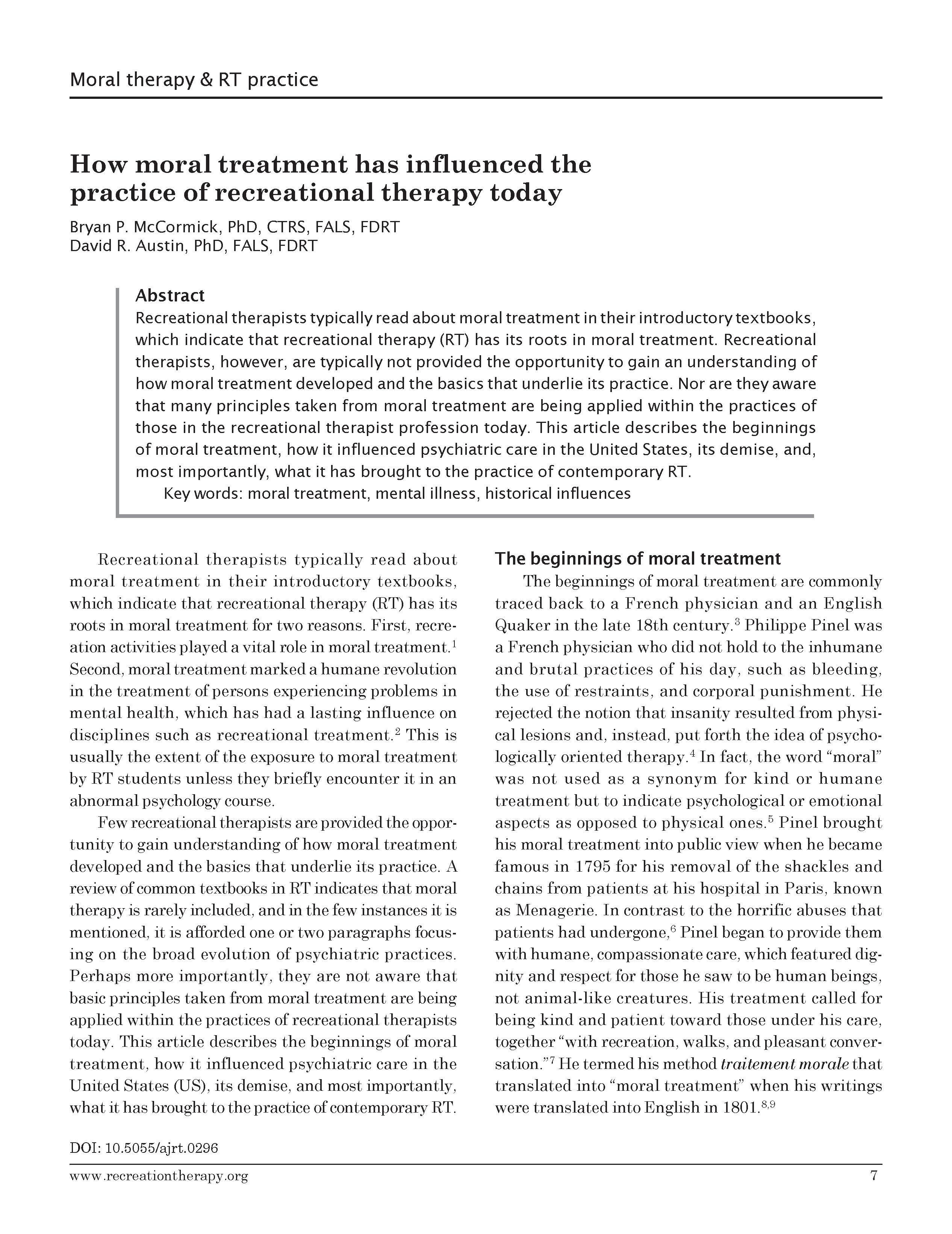How moral treatment has influenced the practice of recreational therapy today
DOI:
https://doi.org/10.5055/ajrt.0296Keywords:
moral treatment, mental illness, historical influencesAbstract
Recreational therapists typically read about moral treatment in their introductory textbooks, which indicate that recreational therapy (RT) has its roots in moral treatment. Recreational therapists, however, are typically not provided the opportunity to gain an understanding of how moral treatment developed and the basics that underlie its practice. Nor are they aware that many principles taken from moral treatment are being applied within the practices of those in the recreational therapist profession today. This article describes the beginnings of moral treatment, how it influenced psychiatric care in the United States, its demise, and, most importantly, what it has brought to the practice of contemporary RT.
References
Galt JM: On the reading, recreation, and amusements of the insane. J Psychol Med Ment Pathol. 1853; 6(24): 581-589.
Austin DR, Crawford ME: The history of therapeutic recreation: A history of two professions. In Austin DR, Crawford ME, McCormick BP, et al. (eds.): Recreational Therapy: An Introduction. 5th ed. Baltimore, MD: Sagamore-Venture, 2020: 31-42.
Peloquin SM: Moral treatment: Contexts considered. Am J Occup Ther. 1989; 43(8): 537-544. DOI: 10.5014/ajot.43.8.537.
Grob GN: The Mad Among Us: A History of the Care of America’s Mentally Ill. New York: Free Press, 1994.
Walk A: Some aspects of the “moral treatment” of the insane up to 1854. J Ment Sci. 1954; 100(421): 807-837. DOI: 10.1192/bjp.100.421.807.
Browne WAF: Moral treatment of the insane. J Ment Sci. 1864; 10(5): 309-337.
Trent JW: Moral treatment. VCU Libraries Social Welfare History Project. n.d. Available at https://socialwelfare.library.vcu.edu/issues/moral-treatment-insane/. Accessed January 27, 2022.
Carlson ET, Dain N: The psychotherapy that was moral treatment. Am J Psychiatry. 1960; 117: 519-524. DOI: 10.1176/ajp.117.6.519.
Ziff K: Asylum on the Hill: History of a Healing Landscape. 1st ed. Athens, OH: Ohio University Press, 2012.
Sprafkin RP: The rebirth of moral treatment. Profess Psychol. 1977; 8(2): 161-169.
Bockoven JS: The Moral Treatment in American Psychiatry. Berlin: Springer, 1963.
Bockoven JS: Moral treatment in American psychiatry. J Nerv Ment Dis. 1956; 124(2): 167-194.
Ikiugu MN, Ciaravino EA: Psychosocial Conceptual Practice Models in Occupational Therapy: Building Adaptive Capability. Maryland Heights, MO: Mosby Elsevier, 2007.
University of Pennsylvania: History of Pennsylvania hospital arrangement. Available at https://www.uphs.upenn.edu/paharc/collections/finding/iphgeneral.html. Accessed February 23, 2024.
Taubes T: “Healthy avenues of the mind”: Psychological theory building and the influence of religion during the era of moral treatment. Am J Psychiatry. 1998; 155(8): 1001-1008. DOI: 10.1176/ajp.155.8.1001.
Kirkbride TS, Julio Mario Santo Domingo C: On the Construction, Organization, and General Arrangements of Hospitals for the Insane. Philadelphia: Lindsay & Blakiston, 1854; 11: 1-37.
Toledo AH: The medical legacy of Benjamin Rush. J Investig Surg. 2004; 17: 61-63.
Shryock RH: The psychiatry of Benjamin Rush. Am J Psychiatry. 1945; 101(4): 429-432.
Alasmawi K, Mann F, Lewis G, et al.: To what extent does severity of loneliness vary among different mental health diagnostic groups: A cross-sectional study. Int J Ment Health Nurs. 2020; 29(5): 921-934. DOI: 10.1111/inm.12727.
Dix D: Memorial to the Massachusetts legislature. 1843. Available at https://usa.usembassy.de/etexts/democrac/15.htm.
Remembering Dorothea SC: “Dragon” dix—Nineteenth century mental health reformer. Bus Renaiss Q. 2008; 3(4): 151-170. Accessed August 23, 2024.
Levin L, Gildea R: Bibliotherapy: Tracing the roots of a moral therapy movement in the United States from the early nineteenth century to the present. J Med Libr Assoc. 2013; 101(2): 89-91. DOI: 10.3163/1536-5050.101.2.003.
Mauger A: The Cost of Insanity in Nineteenth-Century Ireland: Public, Voluntary and Private Asylum Care. 1st ed. Berlin: Springer International Publishing, 2018.
Brigham A: Moral therapy. Am J Insanity. 1847; 4: 1-15.
Carron MA, Saad H: Treatment of the mentally ill in the pre-moral and moral era: A brief report. Jefferson J Psychiatry. 2012; 24(1). DOI: 10.29046/JJP.024.1.001.
Charland LC: Benevolent theory: Moral treatment at the York retreat. Hist Psychiatry. 2007; 18(1): 61-80. DOI: 10.1177/0957154X07070320.
Charland LC: Benevolence and discipline: The concept of recovery in early nineteenth-century moral treatment. In Rudnick A (ed.): Recovery of People with Mental Illness. Oxford: Oxford University Press, 2013: 65-77.
Stoffel VC, Reed KL, Brown C: The unfolding history of occupational therapy in mental health. In Brown C, Stoffel VC, Munoz JP (eds.): Occupational Therapy in Mental Health. Philadelphia, PA: F. A. Davis, 2009: 14-28.
Borthwick C, Holman D, Kennard M, et al.: The relevance of moral treatment to contemporary mental health care. J Ment Health. 2001; 10(4): 427-439. DOI: 10.1080/09638230124277.
Butler JS: The Curability of Insanity and the Individualized Treatment of the Insane. New York City, NY: G.P. Putnam’s Sons, 1887.
Bockoven JS: Moral treatment in American psychiatry. J Nerv Ment Dis. 1956; 124(3): 292-321.
Austin DR: Introduction and overview. In Austin DR, Crawford ME (eds.): Recreational Therapy: An Introduction. 3rd ed. Champaign, IL: Sagamore, 2001: 1-21.

Published
How to Cite
Issue
Section
License
Copyright 2000-2025, Weston Medical Publishing, LLC and American Journal of Recreation Therapy. All Rights Reserved.

